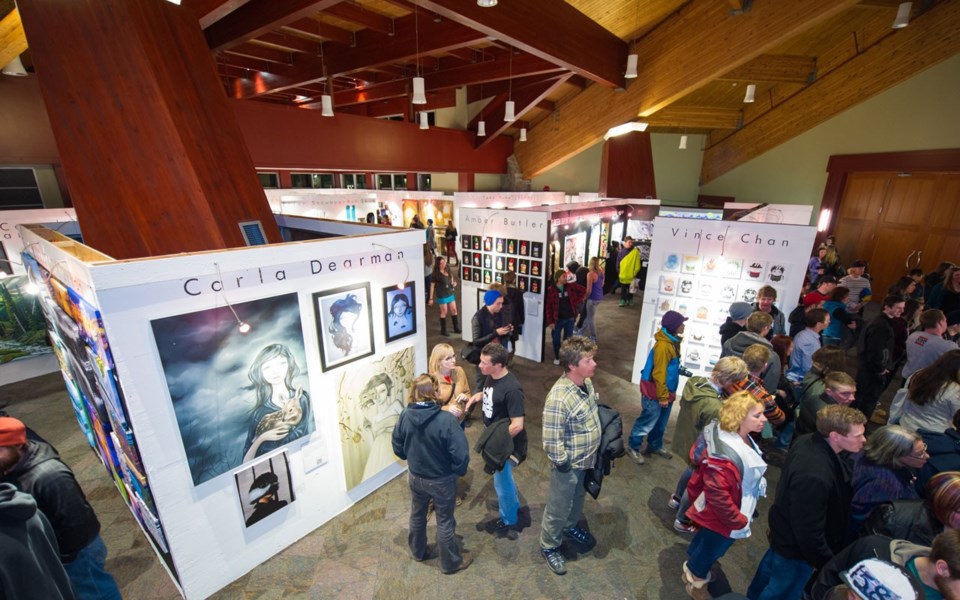The good news is that there is going to be a World Ski and Snowboard Festival (WSSF) in 2018.
And for the first time, it will contain the infamous Saudan Couloir Ski Race Extreme — the legendary race is the world's steepest ski and snowboard competition and is named for Sylvain Saudan, the Evel Knievel of alpine skiing.
Back in the '80s, it was an annual event on Blackcomb and bringing it back already has athletes excited.
But the bad news is that the "revitalized" festival, which has always symbolized Whistler's core mountain culture, is only going to run for six days instead of 10, and some key events have been cut from the schedule.
Left off the events list are State of the Art, Multiplicity, the free outdoor concert series, the Whistler Comedy Showdown, the roller derby, the dog fest, the Slush Cup and ARTdrenaline.
Many would argue that these character events are what speak to our mountain culture — Whistler is more than big concerts and Big Air after all.
At a media briefing this week, Whistler Blackcomb's VP of business development Rob McSkimming said the schedule was still a work in progress and that some or all of these events may show up by the time the festival is ready to roll April 10 to 15.
But I wouldn't hold my breath.
The WSSF is heading into a transition year where organizers are clearly focusing on fewer events with, they hope, more impact. You may recall that festival organizer Watermark Communications stepped away from WSSF last year, handing over the reins to WB (now Vail Resorts) and minority owner Tourism Whistler.
This year, Tourism Whistler is relinquishing its minority ownership share (1/3) in the festival.
It will now be produced 50/50 by Whistler Blackcomb (WB), through its events arm Crankworx, and the Gibbons Hospitality Group.
Asked at the briefing if the budget would stay the same, the answer from all parties was yes, though a dollar figure wasn't shared. Last time Pique reported on the festival's budget it was $1.35 million — but that was in 2013 and it is very likely it has shrunk considerably since then.
Each year, the festival gets funding from the Resort Municipality of Whistler's Festival, Events and Animation committee — last year it was $100,000.
No word yet on the support for 2018 from the RMOW but is likely to remain close to that figure.
It's hard to fathom that this pared-down version of the iconic festival can be described as "revitalized," but Joey Gibbons and WB's McSkimming both pointed to the number of afternoons that only a handful of people showed up to enjoy the free music concerts on the mainstage at Skier's Plaza.
And they contend that having the Big Air Ski and the Big Air Snowboard back to back on the same weekend will drive crowds to the venue and create an unforgettable vibe. It's also hoped that with a purse of $50,000, top names will come to compete — and there is no doubt that this is a festival that is all about celebrating sport. After all, it was snow sports that were the genesis of the event (in its first year, the WSSF had 22 sporting events).
While there will be no mainstage this year, Gibbons said there will be plenty of animation in Skier's Plaza to accompany the major sporting events including "A" list bands and top DJs. There will also be music in clubs and other venues associated with the festival.
And while it's true thousands come to hear the big names of the festival, now in its 23rd year, it has always been a place for local and upcoming talent as well. Indeed curating the talent both on the cultural and the sport side was a passion for former event producer Watermark Communications and Sue Eckersley.
The WSSF has drawn thousands to town with many businesses relying on the event to round out winter profits year after year.
We don't have current economic impact statistics for the event, but a 2012 report found that the festival brought $22.5 million in spending to Whistler in that year.
More than 70,000 guests attended the 2012 festival according to the report — 20,000 were local, more than 33,000 were domestic and more than 17,000 were international.
In total, visitors spent the most on food and drink with $7.2 million, followed by $4.5 million on accommodation, and $3.84 million on recreation and entertainment.
Of course, this was across 10 days.
Change is about the only thing we can count on these days and evolution can be a powerful positive force in Whistler. But it would be a mistake for those driving the change in this case to lose sight of the fact that this is a festival that celebrates what we are and how we live.




